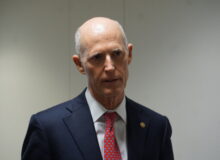Last October, 100+ cargo ships were lined up at the largest port in the country, San Diego and Los Angeles. It looked like a cargo ship version of the lines of people waiting to buy tickets to a concert of their favorite performer. The delay in unloading shiploads of imported goods such as food, toys, and electronics delayed products from reaching shelves and increased prices.
The Biden administration’s 2022 “green” program will increase prices in an economy already suffering from high inflation.

2021 Cargo Ship Back-up
Shipping is being forced into a huge and expensive energy transition to low- or no-carbon fuels. And like most of the rules made by the Biden Administration, the rule is confusing and does not display knowledge of the industry they are trying to regulate and increases the inflation already slowing down the economy.
Per the Wall Street Journal, the shipping companies are having problems figuring out how to execute this regulation:
Shipowners are split on which fuel should be the new industry standard and how soon they can recoup investments to meet environmental targets established by governments and industry regulators. The price tag on investments needed in new ships, alternative fuel production, and other infrastructure has been pegged at $3 trillion over the next few decades, according to shipping-services provider Clarksons.
Methanol is an early contender to supplant the tar-like heavy fuel oil—known as bunker fuel—that powers much of the world’s 60,000 oceangoing commercial vessels. Ocean shipping accounts for roughly 3% of global greenhouse-gas emissions annually, according to the International Maritime Organization, the industry’s global regulator.
Maybe a cheaper solution would be to tie those electric cars that no one wants to the bottom of the container ships; at least try it and see if it works.
About those costs:
Methanol is an early contender to supplant the tar-like heavy fuel oil—known as bunker fuel—that powers much of the world’s 60,000 oceangoing commercial vessels. Ocean shipping accounts for roughly 3% of global greenhouse-gas emissions annually, according to the International Maritime Organization, the industry’s global regulator (…) . Green methanol is an umbrella term covering liquid methanol produced using renewable energy such as wind or solar power. Its production is limited and its price, on average, is 50% to 100% higher than bunker fuel, boxship operators and fuel producers say..
That 50% to 100% increase in fuel price will raise the price of delivering goods to manufacturers. Those price increases will be passed along to the end consumer–more inflation.
The administration has to know this order would lead to higher costs. But in the end, they didn’t care. Green energy is more important than Americans being able to afford food and feed their families.






